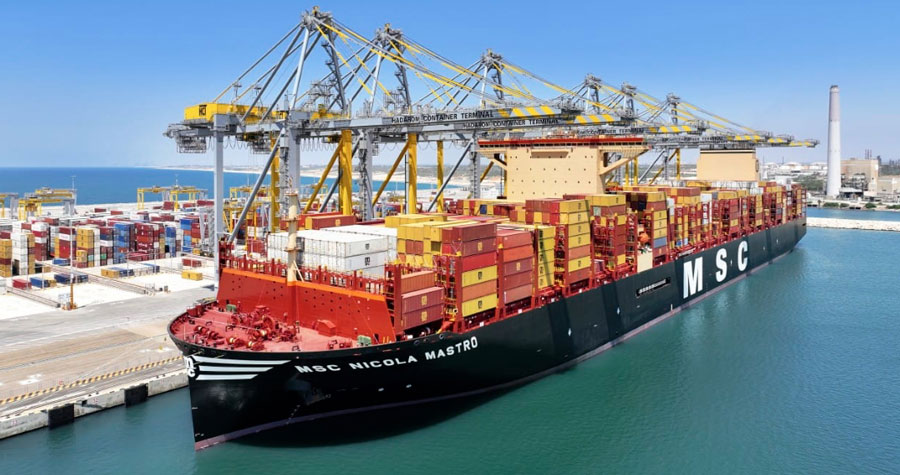


In February 2025, the global shipping market ushered in a major transformation, with Mediterranean Shipping Company (MSC) officially surpassing all competitors to become the world's largest port and terminal operator through a series of strategic expansions. This breakthrough comes as MSC has expanded its fleet aggressively in recent years and revolutionized the competitive landscape of the global port and shipping industry through the $23 billion acquisition of Hutchison Ports.
Largest port deal ever: MSC completes acquisition of Hutchison Ports
A few days ago, MSC, through its Terminal Investment Limited (TiL), together with global investment giant BlackRock, completed the acquisition of an 80% stake in Hutchison Ports, becoming the world's largest port and terminal operator. The transaction involves 43 port assets in 23 countries, including key shipping hubs such as Felixstowe Port in the United Kingdom, ECT Rotterdam in the Netherlands, Busan Port in South Korea, and Manzanillo Port in Mexico.
According to Delury data, the total throughput of all MSC ports and terminals in 2023 is more than 70 million TEU. Upon completion of the transaction, MSC's ports and terminals business (TiL + Hutchison assets) will account for 8.6% of the global market, surpassing PSA International's 7.2% market share in 2023.
How MSC Captures Market share: From shipping juggernaut to Global port giant
MSC has continued to expand in recent years, adopting an aggressive marketing strategy to compete in the global shipping market. The terminal acquisition may also be part of its strategy.
The first step is undoubtedly to overtake Maersk and become the world's largest container liner company. With a capacity of 4,284,728 TEU on 645 vessels, MSC officially overtook Danish shipping giant Maersk to become the world's largest container liner in 2022.
MSC currently operates a fleet of 890 vessels (597 owned and 293 chartered) with an unprecedented total capacity of 6.42 million TEU. In addition to 132 new container ship orders, the total order capacity also reached nearly 2 million TEU. Through an almost frenzied model of shipbuilding + acquisition, MSC controlled huge shipping resources.
MSC's second step is to combine global terminal resources and build an integrated ecology of shipping and ports. In 2023, MSC's terminal business will handle 35% of the world's total. In 2025, the acquisition of Hutchison Ports will make its global port operations larger than PSA's.
Based on the throughput growth of MSC and Hutchison ports, Drewry forecasts that by 2028, the annual handling capacity of MSC's ports and terminals is expected to reach 220 million equivalent units (TEUs), growing the market share to 15%, almost doubling.
MSC President Diego Aponte said bluntly: "We know the industry well and this investment is very commercially viable."
The deal marks a major shake-up in the global shipping industry. With the dual identity of the world's largest liner company + the world's largest port operator, MSC has completely rewritten the rules of the industry and even affected market competition.
Expert analysis believes that the rise of MSC will further accelerate the consolidation of the global shipping industry, and traditional port companies such as PSA International and APM Terminals (Maersk's port company) will face more fierce competition. At the same time, the trend of liner companies dominating the global supply chain is becoming increasingly obvious, and the future market will be more concentrated on competition between a few giants.
Eirik Hooper, ports and terminals analyst at Drewry, said: "The problem is not the 15% market share, but the fact that the world's largest container shipping line is also the world's largest terminal operator, which makes market participants nervous. "
In addition, MSC is able to achieve operational and commercial synergies with this major expansion, but this may not be good news for shippers.
"Industry players are concerned that MSC's terminal and shipping business is so large that it could lead to MSC gradually taking more market share and squeezing out smaller operators who cannot compete," Eirik said.
"In the short term, vertical integration may lead to more efficient logistics services, but in the long term it may mean fewer freight options and less market flexibility."
In short, MSC, with its continuously expanding global shipping network and terminal assets, has comprehensively surpassed Maersk to become the world's most influential shipping and port operator. After the acquisition of Hutchison Port, MSC's global market share will be further expanded, and the global shipping landscape will usher in a new round of reshuffle.
As MSC's presence in the global market continues to grow, the shipping and logistics industry of the future will be dominated by the Swiss giant. The rise of MSC is not only a milestone in the history of global shipping, but also marks a new era in which the global supply chain is fully integrated by shipping companies.





